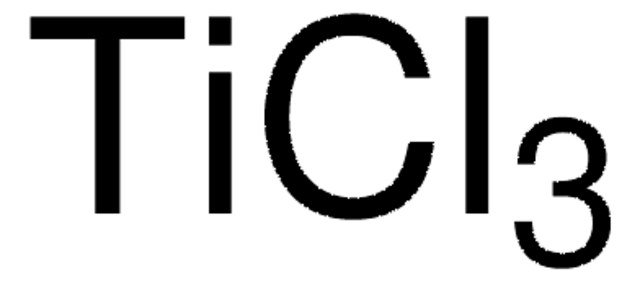697079
Titanium tetrachloride
packaged for use in deposition systems
Synonym(s):
Titanium(IV) chloride, TTC, Titanium tetrachloride
About This Item
Recommended Products
vapor pressure
50 mmHg ( 55 °C)
9.6 mmHg ( 20 °C)
Assay
≥99.995% (trace metals analysis)
form
liquid
reaction suitability
core: titanium
reagent type: catalyst
bp
135-136 °C (lit.)
mp
−25 °C (lit.)
density
1.73 g/mL at 20 °C (lit.)
SMILES string
Cl[Ti](Cl)(Cl)Cl
InChI
1S/4ClH.Ti/h4*1H;/q;;;;+4/p-4
InChI key
XJDNKRIXUMDJCW-UHFFFAOYSA-J
Looking for similar products? Visit Product Comparison Guide
General description
Application
- γ,δ-unsaturated alcohols from allylsilanes and carbonyl compounds,
- N-Phosphinoylimines and N-sulphonylimines from aromatic aldehydes,
- Homoallyl ethers from allylsilanes and acetals.6
Signal Word
Danger
Hazard Statements
Precautionary Statements
Hazard Classifications
Acute Tox. 1 Inhalation - Eye Dam. 1 - Skin Corr. 1B - STOT SE 3
Target Organs
Respiratory system
Supplementary Hazards
Storage Class Code
6.1A - Combustible acute toxic Cat. 1 and 2 / very toxic hazardous materials
WGK
WGK 1
Flash Point(F)
Not applicable
Flash Point(C)
Not applicable
Personal Protective Equipment
Certificates of Analysis (COA)
Search for Certificates of Analysis (COA) by entering the products Lot/Batch Number. Lot and Batch Numbers can be found on a product’s label following the words ‘Lot’ or ‘Batch’.
Already Own This Product?
Find documentation for the products that you have recently purchased in the Document Library.
Customers Also Viewed
Articles
Atomic Layer Deposition (ALD) technology ensures uniform coating on complex 3D surfaces with precise chemisorption cycles.
Atomic Layer Deposition (ALD) technology ensures uniform coating on complex 3D surfaces with precise chemisorption cycles.
Atomic Layer Deposition (ALD) technology ensures uniform coating on complex 3D surfaces with precise chemisorption cycles.
Atomic Layer Deposition (ALD) technology ensures uniform coating on complex 3D surfaces with precise chemisorption cycles.
Our team of scientists has experience in all areas of research including Life Science, Material Science, Chemical Synthesis, Chromatography, Analytical and many others.
Contact Technical Service







